© 2023 Kreativa. All rights reserved. Powered by JoomShaper
Officers and Offices: History of the Santa Ana Police Department
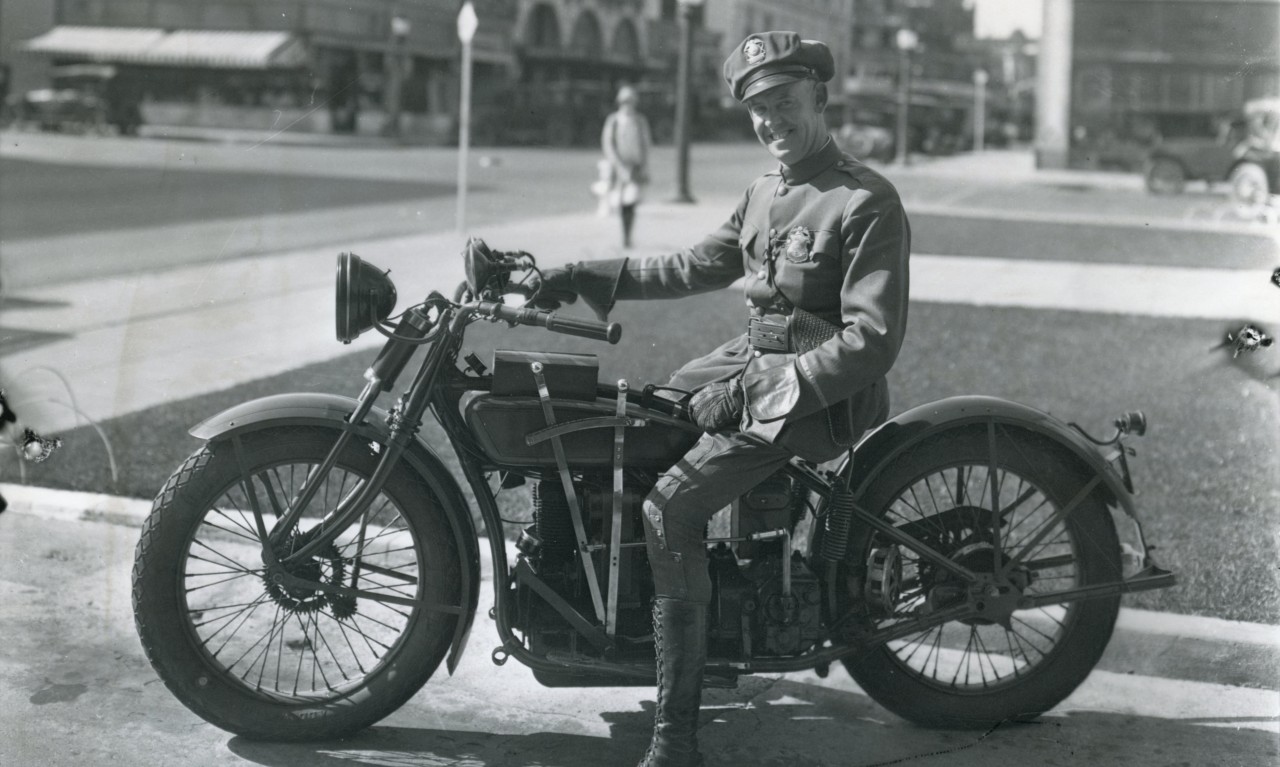 |
| Motorcycle Officer, early 20th Century Unknown Photographer; Santa Ana, California Photographic print; 10 x 8 in. 37057.2 Leo Tiede Photography Collection |
Police Story
California at the end of the 19th and beginning of the 20th centuries was very much a part of the frontier, with justice often poorly exacted by unqualified parties. In its earliest iteration looking for all the world like a town from a Spaghetti Western, the growing City of Santa Ana eventually required law enforcement for its citizens to feel safe, and so part of the city’s growth became the establishment and evolution of the Santa Ana Police Department (SAPD). As the Bowers Blog continues our series on early Santa Ana for the city’s 150th anniversary, today’s 5th post on the subject looks at the history of the SAPD and explores some of the objects used in police work before the latter half of the 20th Century.
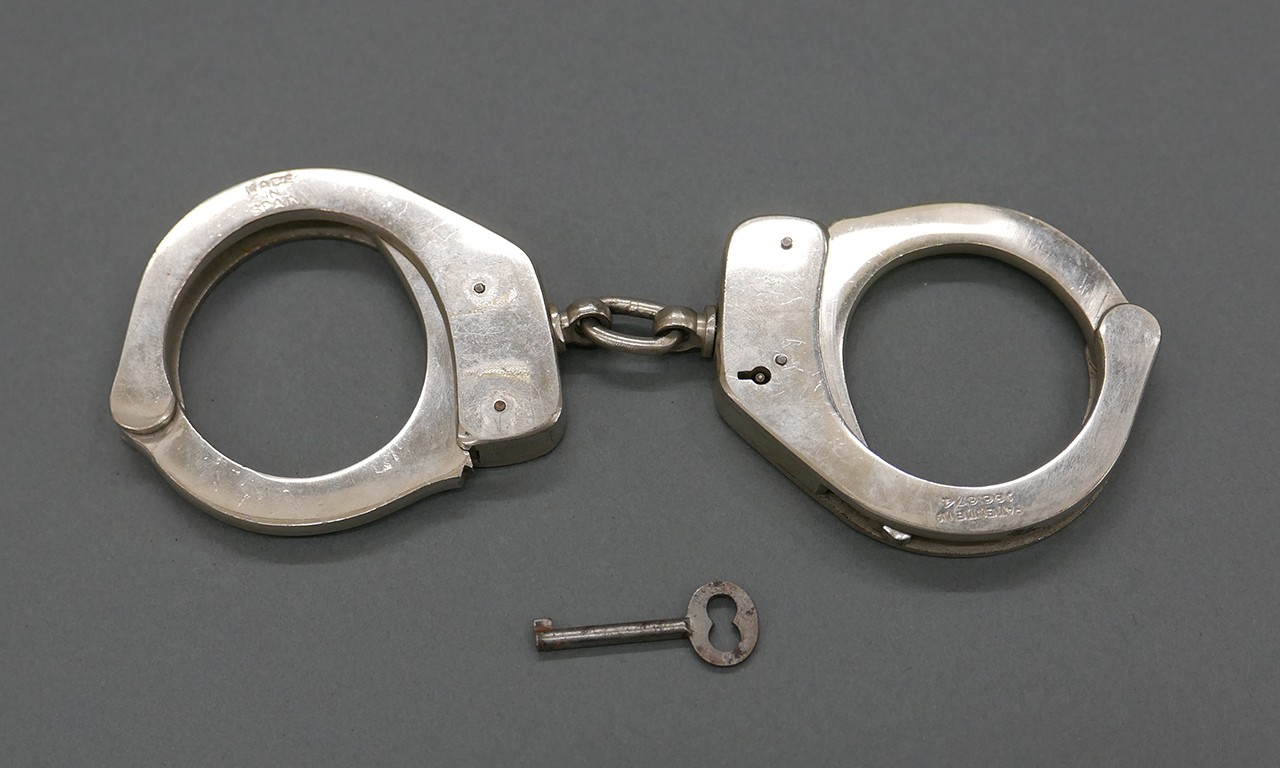 |
| SAPD Handcuffs, 1955 Star Brand; Spain Plated nickel 18413 Gift of Harry I. Fink |
Orange is the New County
Santa Ana was founded in 1869, and 17 years later in 1886 the city was formally incorporated. Three years later, in 1889, Orange County officially emerged from the shadow of Los Angeles County with Santa Ana as the seat. Both the incorporation of Santa Ana and the creation of Orange County led to growth, and in turn put a lot of pressure on both new entities. The burgeoning administrative divisions needed their own law enforcement to police themselves and so Santa Ana formed the SAPD—originally consisting of a Chief of Police and six part time officers in 1886 for a city with a population of 2,000—and Orange County Sheriff’s Department (OCSD) was founded.
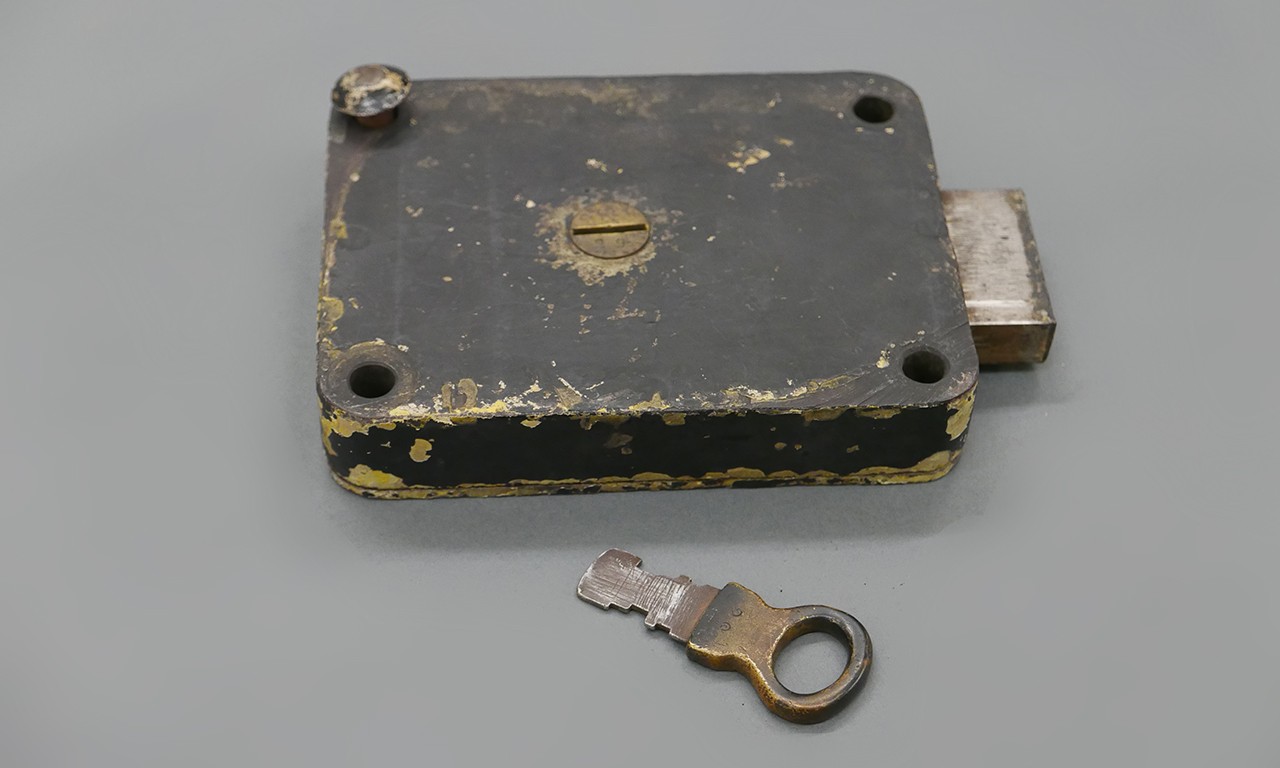 |
| Lock and Key of First Orange County Jail, c. 1889 Santa Ana, California Brass; 1 5/8 x 7 13/16 x 6 in. 2746 Gift of Mr. Otto Jay Hawley |
Jail House News
Both departments required jails to house captured criminals. In 1889, the basement of Joseph Hilbrunner’s of Santa Ana, a jewelry store, doubled as the jail. This basement jail was not a complete novelty. There are recorded accounts of intoxicated men being held overnight in basements dating back to the 1870s and generally the jail served its purpose well between August 1889 and May 1890 until eight prisoners managed to throw the lock open and walk right out. The city saw the need for a formal prison and later in 1890 the first Sycamore Street Jail was opened. This lock and key are from one of the internal doors of this jail. Unfortunately, the jail had security problems and shortly after the opening there were two breakouts. In 1897, the Spurgeon Square Jail, or “Lacy’s Hotel,” named for the same Theo Lacy mentioned in this post opened. This jail served not only Santa Ana but also the county for the next 27 years. When Lacy’s Hotel closed, it was replaced by the Second Sycamore Street Jail or “Old Sycamore,” which used for the next 44 years from 1924 until 1968 when it was closed after the completion of the Central Jail complex, which is still in use today.
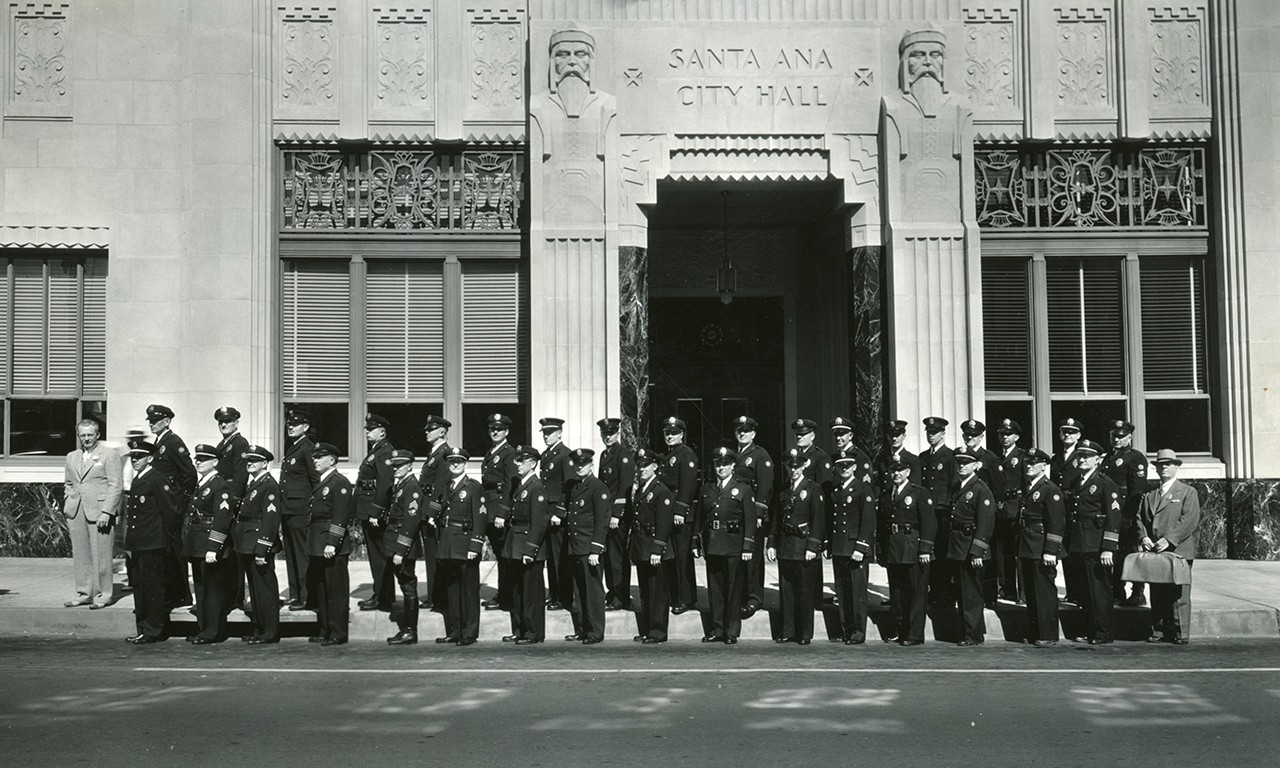 |
| Santa Ana Police Department, 1930-1939 Unknown Photographer; Santa Ana, California Photographic print; 9 1/2 x 7 1/2 in. 33776 Gift of Santa Ana Chamber of Commerce |
Trying to Find a Home
SAPD headquarters also had its share of trouble finding a permanent locale as Santa Ana continued to develop. The city hall and all its offices were run out of rented rooms in 1886 while the city tried to establish not only its own formal bureaucratic infrastructure, but that of the county as well. Many buildings were created to house the offices of the SAPD, including the old courthouses and some of the jails mentioned above. By 1904 Santa Ana had a purpose-built city hall, but the 1933 earthquake damaged it beyond repair. After the quake the new city hall included the police department. Today the Santa Ana Police Department has grown from the original 6 part time officers to over 300 sworn officers and over 200 civilian employees and includes 5 canine units, an 11-officer equestrian unit, a 37-officer SWAT, and a shared helicopter unit with Costa Mesa and Newport Beach via Airborne Law Enforcement (ABLE).
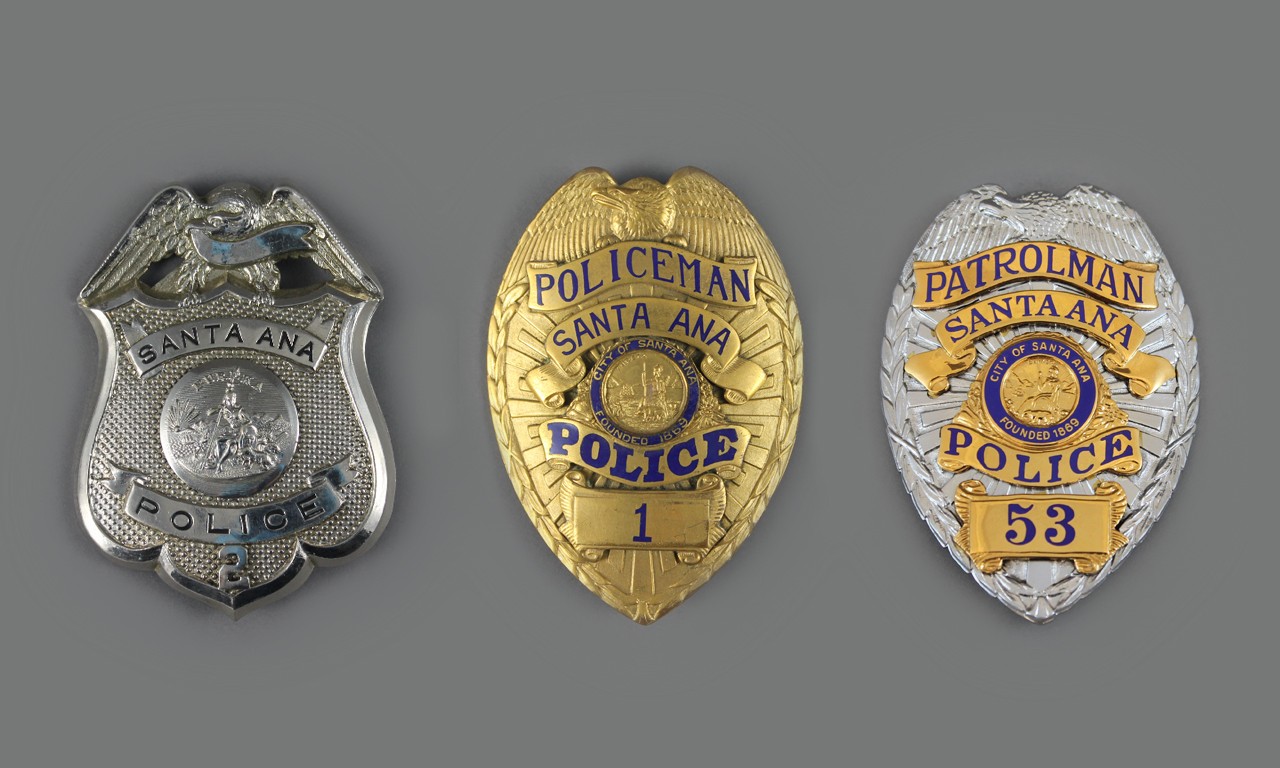 |
| SAPD Badges; 1915-1931(Left), 1931-1951 (Center) and 1951-1955 (Right) Santa Ana, California Metal and enamel 18408-18410 Gift of Harry I. Fink |
Badge of Honor
The above police badges are examples that were worn by SAPD officers between 1915 and 1955. The history of the badges worn by police officers goes back much further than that, however. Badges—in the contemporary sense—were first used in Europe in the Middle Ages to indicate where a person came from and whether they were of noble or common birth. Through time, badges came to be used by certain trades to distinguish industry professionals from those without any formal credentials. These adornments were adopted by law enforcement officers for this same purpose. Badge design changed over the early century to be consistent with larger evolving aesthetic trends in the United States, but each of these badges has largely the same elements: The Great Seal of California; banners with “Santa Ana,” “Police” and an officer’s badge number; and a bald eagle.
This post was researched and co-written by Samantha Leicht-Ruskey. Text and images may be under copyright. Please contact Collection Department for permission to use. References are available on request. Information subject to change upon further research.

Comments 1
Would like to see more